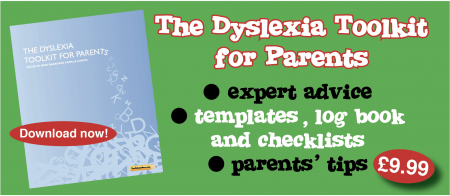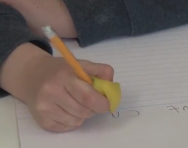How dyslexia affects writing

Some children are born writers and love nothing more than pouring their imagination onto the page. But others have great difficulty with written work, whether it’s creative or factual. This is often the case for children with dyslexia.
Dyslexia doesn’t affect a child’s ability to come up with brilliant ideas for their written work. ‘Some dyslexics are tremendously good writers, with wonderful creative ideas,’ agrees Kate Saunders, chief executive officer of the British Dyslexia Association. But there are areas in which writing can be a particular challenge.
Writing challenges for dyslexic children: spelling
It’s natural for kids to struggle with spelling, especially when you consider that around 50 per cent of words in the English language are in some way irregular. But spelling can be especially hard for children with dyslexia, for a range of reasons.
They often struggle to order the letter groups in a word correctly. They may write certain letters backwards. They can struggle to link a sound to the letters that represent it, and they may have problems committing the shape of a word to their memory. ‘This difficulty with spelling can be very frustrating to a child who’s trying to put their ideas on paper,’ explains Kate.
Writing challenges for dyslexic children: organisation
Poor organisation is an issue for many children with dyslexia, and not just when it comes to remembering their PE kit or what they have to do for homework. ‘Pupils often need help with planning their writing,’ Kate says. ‘If they don’t have a plan for what they’re going to write, they can lose the thread of where their work is going.’
Writing challenges for dyslexic children: punctuation and sentence structure
Because reading is laborious for children with dyslexia, they’re less likely to read for pleasure, which has a knock-on effect on their writing. ‘They don’t necessarily realise that the way we write is different from the way we speak, which means they may have difficulty choosing vocabulary and structuring their sentences,’ Kate explains.
Children with dyslexia sometimes have trouble with punctuation, too. ‘Because they have so much to think about, such as spelling, handwriting and sentence structure, punctuation can fall by the wayside as they have so many other things to think hard about,’ adds Kate.
Writing challenges for dyslexic children: following written instructions
Often, written work involves following written instructions, and that in itself can be difficult for dyslexic children. Their slower and less fluent reading ability and difficulty with organisation may mean that they find it harder to follow instructions in writing than they would verbally.
Dyslexic children can also have difficulty remembering a series of instructions given verbally by the teacher, so strings of commands should be avoided, and instructions given only 2 at a time.
Writing challenges for dyslexic children: handwriting
Having dyslexia doesn’t necessarily mean that children have poor handwriting, but some have a co-existing disorder called dysgraphia. This condition is typified by slow, untidy and even illegible handwriting. ‘If children lack fluency in their writing, they’ll find it physically harder, and they may find it difficult to read their own writing, which makes it hard to re-read, correct and edit their work,’ Kate explains.
Writing challenges for dyslexic children: low output
The combination of difficulties that children with dyslexia may face means that many of them work very slowly. ‘Teachers and parents often find that dyslexic children produce a smaller quantity of written work than their peers, and that what they do produce doesn’t reflect their academic ability or understanding of a topic,’ Kate says.
7 strategies for helping dyslexic children with writing
1. Help them with keywords
Taking away some of the effort of thinking about spelling can help dyslexic children focus on the structure and content of their writing. ‘For example, they could have a box of keywords – commonly used words and words related to the task – on their table to use as prompts while they’re writing,’ says Kate.
2. Allow computer work
Dyslexic children can find it much easier to produce written work on the computer than by hand, especially longer pieces. As they get older, you can introduce the spellchecker, although this does require some mastery of spelling as certain errors (such as ‘their’ instead of ‘there’) may not be picked up. Dictation software can also be useful for children who struggle with the writing process.
3. Try handwriting tools
If your child has difficulty with handwriting fluency, there are plenty of writing aids that can help, ranging from special pencils to sloped surfaces to use on their desk. ‘Spend some time making sure they’re sitting correctly and gripping their pen properly,’ Kate advises. ‘A pen or pencil with a triangular shaft can encourage a good handwriting grip.’ Build fluent movement of the hand across the page by encouraging them not to press down too hard.
4. Listen to stories out loud
Reading aloud to your child and encouraging them to listen to audiobooks can help to improve the quality of their writing. ‘Dyslexics tend not to read for pleasure as it’s such hard work, so listening to stories can help them understand how written English differs from spoken English,’ Kate says.6. Encourage planning
‘Children with dyslexia often benefit from someone helping them plan their work,’ Kate says. This could take the form of brainstorming a topic, writing a paragraph plan, or listing key points that they need to include in their written work.
5. Encourage planning
‘Children with dyslexia often benefit from someone helping them plan their work,’ Kate says. This could take the form of brainstorming a topic, writing a paragraph plan, or listing key points that they need to include in their written work.
6. Break tasks into chunks
Because children with dyslexia tend to write more slowly than their peers, written tasks can seem insurmountable. To make them less daunting, encourage your child to split homework into manageable chunks, for example by getting them to write a paragraph at a time, followed praise or a reward. Simply 'being there’ to help them get down to starting to write can also be very helpful.
7. Don’t obsess about accuracy
While good spelling and neat handwriting are important, the content of children’s writing matters just as much – and sometimes more. Make sure you give your child due praise and recognition for their ideas and creativity, rather than always pointing out the errors they’ve made.
For more advice and support with your child’s dyslexia, visit www.bdadyslexia.org.uk or contact the helpline on 0333 405 4567 or by email at [email protected].

Give your child a headstart
- FREE articles & expert information
- FREE resources & activities
- FREE homework help









